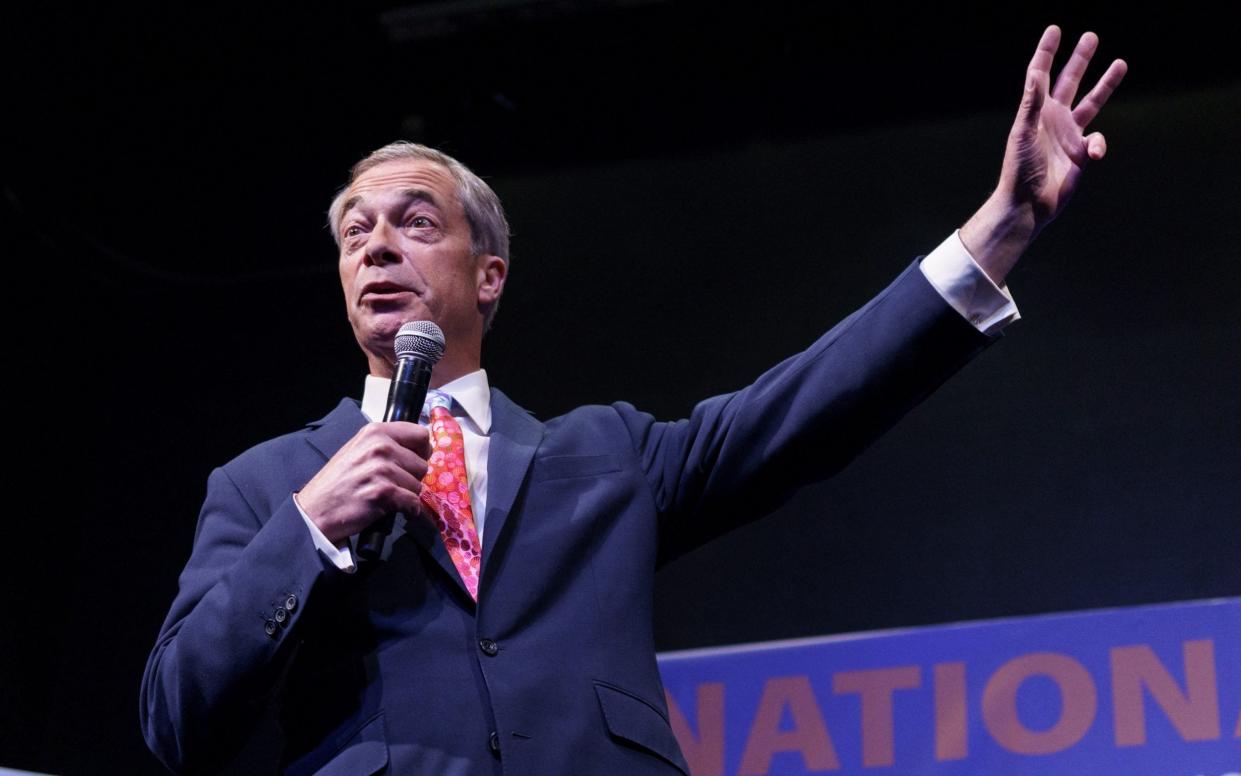The Left thinks everyone has ‘rights’ – apart from Nigel Farage

There can be little doubt that very few of the speakers invited to attend the now infamous National Conservative conference in Brussels would be on the guest list of any Islington dinner party.
There was Nigel Farage, of course, a hate figure even among those who think hatred can, and should be, combatted by Acts of parliament. Or Victor Orbàn, the Hungarian prime minister – a poster boy for the ‘intolerant Right’.
That the conference is being allowed to go ahead today will be a cause of regret, not only to the local mayor who sent the police yesterday to shut it down, but to many politicians and commentators here in the UK.
Even Shadow health secretary Wes Streeting was having fun with the news of the debacle while at the despatch box in the Commons yesterday, smirking away merrily at the thought of politicians he disagreed with being silenced by the state. Oh, what larks!
The British political tradition was, until relatively recently, one of tolerance for opponents and their views. Until the Scottish independence referendum, it was acknowledged that political parties generally didn’t protest their opponents’ meetings and conferences. That gesture of tolerance disappeared in the aftermath of the referendum, when Scottish Labour delegates found themselves having to negotiate crowds of abusive nationalists as they entered and left their conferences.
Then Jeremy Corbyn became leader of the Labour Party, offering a green light to the hard-Left’s more radical elements. Suddenly, delegates to the Conservative conference in Manchester had to walk a gauntlet of aggressive abuse, while dummies were hanged from bridges, just to show supporters of the party of Government that they were not welcome there.
Like many of the dubious social movements that have infected British society, this new political intolerance has at least some of its roots in the United States, where the Black Lives Matter movement and, before that, Donald Trump’s presidency, sent a large proportion of society off the deep end. Antifa seeks to intimidate those who disagree with its socialist ideals. The fashion for forcibly silencing women who believe in the reality of biological sex, either by a punch or a letter of dismissal, started on American campuses, and before you could take a knee, it had travelled across the Atlantic to Blighty and beyond.
The attempt to silence the National Conservative gathering in Brussels was a logical development in this new puritanism. Putting pressure on venues to cancel or not accept a booking for the conference is similar to the tactic of the organisation Hope Not Hate, which imagines itself as a bulwark against the onslaught of the new fascism, but in fact simply campaigns to persuade companies not to place ads with newspapers whose editorial stance they dislike.
When everyone is a “fascist”, then no one is. The “far-Right” used to be defined as those who shunned democracy in favour of violence and who targeted minorities because of the colour of their skin. Now it seems to include anyone who thinks there should be less immigration, illegal or otherwise, who believe women don’t have penises, who recognise that Islamist terrorism is, on the whole, a bad thing, and who don’t regret voting in 2016 to leave an undemocratic trading agreement.
When everyone from democratically elected politicians to news websites publishing mainstream, popular opinions, from political parties to women campaigning for same-sex spaces and sports, are being silenced and intimidated by their opponents, something is dreadfully wrong. When the police themselves, in Scotland as well as in Brussels, are used by politicians to silence inconvenient opinions, then the social consensus that maintains our democracy is in very serious trouble.
There was a time when my old party, the Labour Party, could be relied upon to champion freedom of expression, including expressions with which it disagreed. Voltaire may not actually have said “I disapprove of what you say, but I will defend to the death your right to say it”, but that maxim used to serve as the touchstone for modern, democratic, liberal tolerance. We consider ourselves civilised by acknowledging the value of the tolerance of different opinions that are legally expressed, however much we disapprove of them.
Is that still the case? Streeting’s obvious delight at the attempted closure of the National Conservative conference and the indulgent smirks of his colleagues suggests strongly that the next Labour government is unlikely to prioritise the defence of the rights of their opponents to say what they think, especially if it amounts to criticism of the Labour government.


